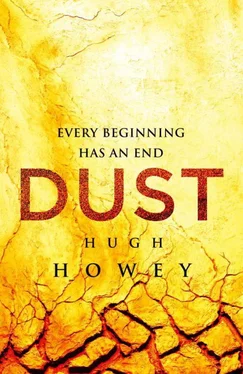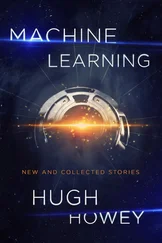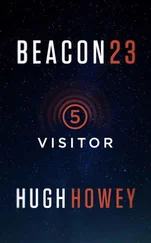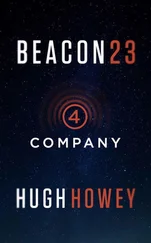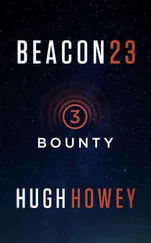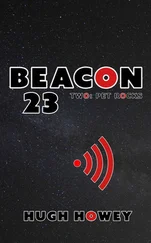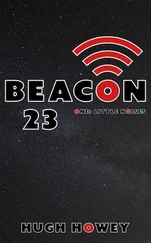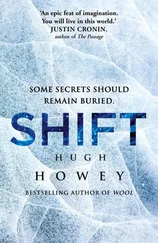She waved the light away and tried to roll onto her side. She was on damp steel plating, someone’s undershirt tucked under her head, not on a bed. Her stomach lurched, but nothing came out. It was hollow, cramping, heaving. She made gagging noises and spat on the ground. Her father urged her to breathe. Raph was there, asking her if she’d be all right. Juliette bit down the urge to yell at them all, to yell at the world to leave her the hell alone, to hug her knees and weep for what she’d done. But Raph kept asking if she was okay.
Juliette wiped her mouth with her sleeve and tried to sit up. The room was dark. She was no longer inside the digger. A lambent glow beat from somewhere, like an open flame, the smell of burning biodiesel, a home-made torch. And in the gloom, she saw the dance and swing of flashlights at the ends of disembodied hands and on miners’ helmets as her people tended to one another. Small groups huddled here and there. A stunned silence sat like a blanket atop the scattered weeping.
“Where am I?” she asked.
Raph answered. “One of the boys found you in the back of that machine. Said you were curled up. They thought you were dead at first—”
Her father interrupted. “I’m going to listen to your heart. If you can take deep breaths for me.”
Juliette didn’t argue. She felt young again, young and miserable for breaking something, for disappointing him. Her father’s beard twinkled with silver from Raph’s flashlight. He plugged his stethoscope into his ears, and she knew the drill. She parted her coveralls. He listened as she swallowed deep gulps of air and let them out slowly. Above her, she recognized enough of the pipes and electrical conduit and exhaust ducts to locate herself. They were in the large pump facility adjacent to the generator room. The ground was wet because all this had been flooded. There must be water trapped above here, a slow leak somewhere, a reservoir gradually emptying. Juliette remembered all the water. She had donned a cleaning suit and had swum past this room in some long-ago life.
“Where are the kids?” she asked.
“They went with your friend Solo,” her father said. “He said he was taking them home.”
Juliette nodded. “How many others made it?” She took another deep breath and wondered who was still alive. She remembered herding all that she could through the dig. She had seen Courtnee and Walker. Erik and Dawson. Fitz. She remembered seeing families, some of the kids from the classrooms, and that young boy from the bazaar in shopkeep brown coveralls. But Shirly… Juliette reached up and gingerly touched her sore jaw. She could hear the blast and feel the rumbles in the ground again. Shirly was gone. Lukas was gone. Nelson and Peter. Her heart couldn’t hold it all. She expected it to stop, to quit, while her father was listening to it.
“There’s no telling how many made it,” Raph said. “Everyone is… it’s chaos out there.” He touched Juliette’s shoulder. “There was a group that came through a while back, before everything went nuts. A priest and his congregation. And then a bunch more came after. And then you.”
Her father listened intently to her stubborn heartbeat. He moved the metal pad from one corner of her back to another, and Juliette took deep, dutiful breaths. “Some of your friends are trying to figure out how to turn that machine around and dig us out of here,” her father said.
“Some are already digging,” Raph told her. “With their hands. And shovels.”
Juliette tried to sit up. The pain of all she’d lost was hammered by the thought of losing those who remained. “They can’t dig,” she said. “Dad, it’s not safe over there. We have to stop them.” She clutched his coveralls.
“You need to take it easy,” he said. “I sent someone to fetch you some water—”
“Dad, if they dig, we’ll die. Everyone over here will die.”
There was silence. It was broken by the slap of boots. A light slashed the darkness up and down, and Bobby arrived with a dented tin canteen sloshing with water.
“We’ll die if they dig us out,” Juliette said again. She refrained from adding that they were all dead anyway. They were walking corpses in that shell of a silo, that home for madness and rust. But she knew she sounded just as mad as everyone else had, cautioning against digging because the air over here was supposed to be poison. Now they wanted to tunnel to their death as badly as she had wanted to tunnel to hers.
She drank from the canteen, water splashing from her chin to her chest, and considered the lunacy of it all. And then she remembered the congregation that’d come over to exorcise this poisoned silo’s demons, or maybe to see the devil’s work for themselves. Lowering the canteen, she turned to her father, a looming silhouette in the spill of light from Raph’s torch.
“Father Wendel and his people,” Juliette said. “Was that… ? They were the ones who came earlier?”
“They were seen heading up and out of Mechanical,” Bobby said. “I heard they were looking for a place to worship. A bunch of the others went up to the farms, heard there was still something growing there. A lot of people are worried about what we’ll eat until we get out of here.”
“What we’ll eat,” Juliette muttered. She wanted to tell Bobby that they weren’t getting out of there. Ever. It was gone. Everything they had known. The only reason she knew and they didn’t is because she had stumbled through the piles of bones and over the mounds of the dead getting into this silo. She had seen what becomes of a fallen world, had heard Solo tell his story of dark days, had listened on the radio as those events played out all over again. She knew the threats, the threats that had now been carried out, all because of her daring.
Raph urged her to sip some more water, and Juliette saw in the flashlit faces around her that these survivors thought they were merely in a spot of trouble, that this was temporary. The truth was that this was likely all that remained of their people, this few hundred who had managed to get through, those lucky enough to live in the Deep, a startled mob from the lower Mids, a congregation of fanatics who had doubted this place. Now they were dispersing, looking to survive what they must hope would be over in a few days, a week, simply concerned with having enough to eat until they were saved.
They didn’t yet understand that they had been saved. Everyone else was gone.
She handed the canteen back to Raph and started to get up. Her father urged her to stay put, but Juliette waved him off. “We have to stop them from digging,” she said, getting to her feet. The seat of her coveralls was damp from the wet floor. There was a leak somewhere, pools of water trapped in the ceilings and the levels above them, slowly draining. It occurred to her that they would need to fix this. And just as quickly, she realized there was no point. Such planning was over. It was now about surviving the next minute, the next hour.
“Which way to the dig?” she asked.
Raph reluctantly pointed with his flashlight. She pulled him along, stopped short when she saw Jomeson, the old pump repairman, huddled against a wall of silent and rusted pumps, his hands cupped in his lap. Jomeson was sobbing to himself, his shoulders pumping up and down like pistons as he gazed into his hands.
Juliette pointed her father to the man and went to his side. “Jomes, are you hurt?”
“I saved this,” Jomeson blubbered. “I saved this. I saved this.”
Raph aimed his flashlight into the mechanic’s lap. A pile of chits glimmered in his palms. Several months’ pay. They clinked as his body shook, coins writhing like insects.
“In the mess hall,” he said between sniffles and sobs. “In the mess hall while everyone was running. I opened the till. Cans and cans and jars in the larder. And this. I saved this.”
Читать дальше
